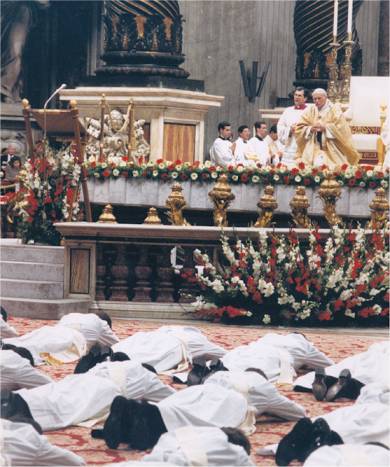Cincinnati Magazine has posted the article on Sr. Louise Akers online. At nearly 5,000 words, it is quite the tome. I was quoted twice, as was frequent commentator Gail Finke:
As vocations director for the Archdiocese of Cincinnati, the Rev. Kyle Schnippel often delivers homilies at local parishes asking members to encourage young men to consider the priesthood. And often, standing outside a church after Mass, someone will come up and say, “You wouldn’t have this problem if you didn’t overlook half the population.”
“I’m in sales, I’m not in management,” Schnippel quips as he settles into answering one of the hardest questions he faces in his job. Even ardent supporters of the Vatican’s position acknowledge it’s not an easy case to make; indeed, surveys show that about 60 percent of American Catholics oppose the Vatican ban on women’s ordination. “This is one of the few areas in the world today where women are told, You can’t take part in this. This isn’t open to you,” Schnippel says. “Even faithful women who love the Church, the first time they hear that it’s like, Whoa.”
The argument in favor of women’s ordination is fairly simple: supporters believe that historical and cultural sexism has kept women out of positions of power, and that ordination is a path to a specific kind of power, akin to running corporations and winning elected office. “I feel no call to become a priest, but if women feel called to the priesthood they should have that path open to them,” Akers says. “Women’s ordination is a justice issue. Its basis is the value, dignity, and equality of women.”
The arguments against the ordination of women are a bit more complicated and require some knowledge of Catholic tradition and teaching. Those who support the Vatican’s position point out that the Church can hardly be accused of turning its back on women: there are more female Catholic saints than male; women hold leadership positions across the church worldwide; and Catholic sisters were creating and managing health-care systems and school districts long before American women could vote. But they also believe that contemporary Catholic priests and bishops are the direct successors of the 12 apostles Jesus chose to carry out his ministry, who in turn replaced the 12 tribes of Israel; because Jesus intentionally chose only men as apostles, the church is not free to change this requirement.
“There have never been women priests in the Catholic Church. It’s a 2,000-year understanding of the Church that priesthood is a sacrament that continues the apostolic tradition,” says Gail Finke, a female student in the lay pastoral ministry program at the Athenaeum of Ohio in Mt. Washington, which also trains the archdiocese’s seminarians. “There’s cultural confusion in our time that says, If I don’t get to do exactly what other people do, I’m not equal. But most men aren’t going to be ordained either. It’s not like the Church is saying, ‘Ha ha ha! You can’t become a priest!’”
Opponents of female ordination stress that the Catholic Church must look at the issue in terms of what Jesus intended and what the Church’s traditions are, rather than what current cultural imperatives call for; and further, that the call of Vatican II to engage in the world didn’t intend for the Church to take its marching orders from contemporary society.
“It’s difficult, especially in American culture, modernist culture, where everything is up for grabs and church is what we decide it to be, and we’re going out and saying, ‘No, the truth is what is established by Christ,’” Schnippel says. It’s not something the Church invented, he insists. “This is what Christ teaches.”
Tuesday, January 26, 2010
Subscribe to:
Post Comments (Atom)










5 comments:
I believe Fr. Schnippel hit the nail on the head when he said that Americans have a "anything goes" mentality.
Our parish priest refers to the same mindset as "buffet Catholics" and then proceedes to tell us that "would be wrong."
North Americans have lost a sense of rights along with responsibilities and it's time to recover that mindset.
Fr Kyle:
thank you being strong and good priest - there are many of us praying for you - this issue of womens ordination is obviously a bigger issue - part of a deeper faith crisis within our Church - I see a compassionate break in the Catholic Church which maybe is not a bad thing
I was wondering, did you say much else and it was edited out?
JFK:
Yeah, I spoke with the author for about 15, 20 minutes, if I remember right.
The explanation of what the Church does here is very easy: we do what our Lord and the Apostles did. If we think they were prone to mess up, then we have an epic-fail problem here, not just a dispute over one issue.
So those who set aside the example of Christ and the Apostles in this case undermine the entire foundation of the Church. If the Apostles cannot be relied upon...then we know next to nothing about Jesus, and all our beliefs about him are up for grabs--all of them.
So if we ask why the Church doesn't ordain women, the answer is, because Jesus and the Apostles didn't, and being the Apostolic (in addition to one, holy and Catholic) Church means we trust and follow the Apostles to have gotten it right, as the chosen and Spirit-led instruments of the Lord himself.
Now...asked why the Lord did it that way? That's where we get more into conjecture, and some explanations are more persuasive than others.
But the issue doesn't stand or fall on whether I can give a sufficiently plausible rationale for our Lord's actions, because the Lord doesn't need to justify himself to anyone. I'm not suggesting there aren't reasonable arguments; only that it fundamentally comes down to this: Jesus said, "follow me"; "do this in remembrance of me"; "I am the way."
At various times, people were offended in him, and they left. He was sorrowful; and perhaps he brought them back, but the Gospels don't tell us--but our Lord did not feel compelled to persuade everyone. He is the Lord! That he has gone to such lengths to be persuasive and alluring, all these millenia, culminating in the Incarnation and the Passion...how is that not enough?
Post a Comment